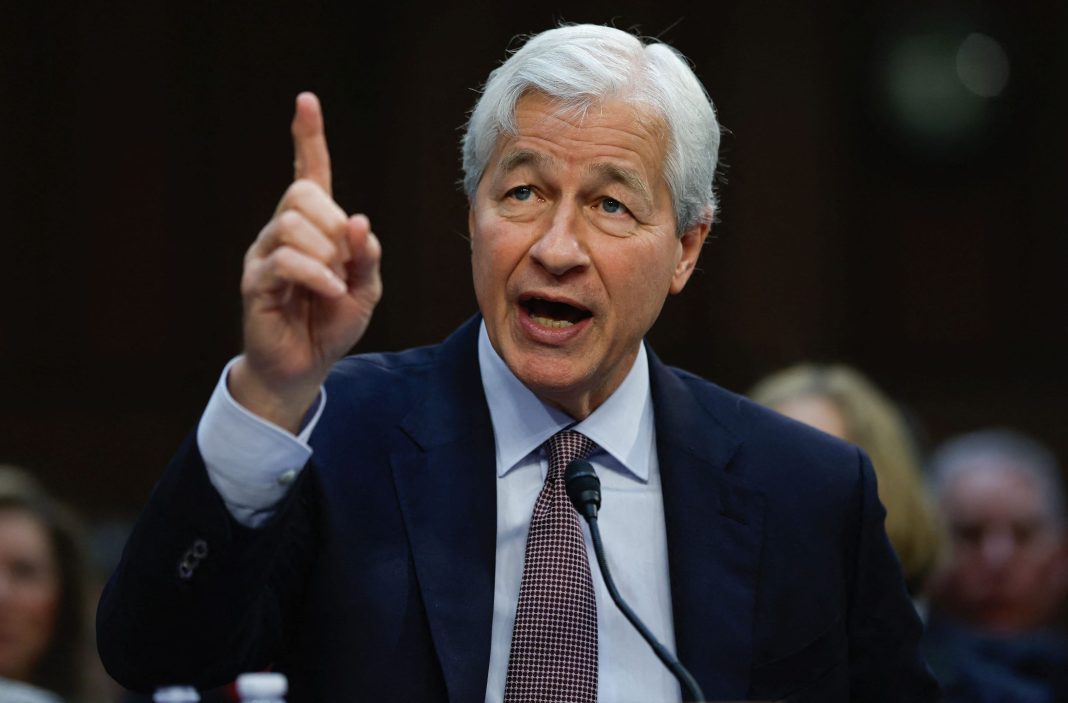In the complex and tumultuous landscape of American banking, the recent revelations about JPMorgan Chase’s relationship with regulators have sparked a significant debate about accountability, consumer protection, and the evolving dynamics between financial institutions and government oversight. At the heart of this issue lies Jamie Dimon, the bank’s CEO and Chairman, whose leadership has been both celebrated and scrutinized as the institution grapples with mounting regulatory challenges.
In a lengthy quarterly filing, JPMorgan disclosed that it may face penalties from the Consumer Financial Protection Bureau (CFPB) regarding its involvement with Zelle, a prominent peer-to-peer digital payments network. The bank has been accused of inadequately removing criminal accounts from the platform and of failing to compensate victims of scams. This situation underscores a growing tension: the once unthinkable notion of a bank engaging in litigation against its regulatory overseers is now a potential reality. As Tobin Marcus, head of U.S. policy at Wolfe Research, points out, “If you go back 15 or 20 years, the view was it’s not particularly smart to antagonize your regulator.”
This shift in attitude reflects a more combative environment for banks, particularly in light of post-2008 financial crisis reforms aimed at curbing Wall Street’s excesses. The CFPB, established to protect consumers from financial misdeeds, has increasingly become a target for banks facing populist scrutiny. Trade groups argue that institutions like JPMorgan are merely acting in self-defense against what they perceive as an overreach by regulators. However, advocates for tighter regulations contend that banks have leveraged their influence to challenge reform efforts, often resorting to litigation in conservative jurisdictions that favor their interests.
Compounding the situation is the backdrop of the Basel Endgame, a proposed set of regulations aimed at ensuring larger banks hold more capital to mitigate risks from trading and lending activities. As the financial industry braces for potential changes, Marianne Lake, head of JPMorgan’s consumer bank, has warned investors that the current regulatory landscape poses a significant threat to profitability. The stakes are high; the cumulative effect of proposed regulations could inflate the costs of mortgages and credit, ultimately impacting consumers.
Among the most pressing issues is the scrutiny surrounding Zelle, which was designed to compete with other payment platforms like PayPal. While the vast majority of the $806 billion processed through Zelle last year was benign, the platform has faced criticism for its handling of disputed transactions. A Senate report revealed that the three largest banks on the network collectively reimbursed only 38% of fraudulent claims, raising serious concerns about consumer protections. In response to increasing scrutiny, JPMorgan has begun to issue warnings to Zelle users about potential scams, further highlighting the complexity of consumer trust in digital payment systems.
Dimon, who has navigated the bank through crises past, stands at the forefront of these regulatory battles. His influence allows him to openly question regulatory frameworks, as demonstrated during JPMorgan’s investor day when executives argued that increased regulation could harm consumers rather than protect them. “The message is clear: banks won’t just absorb the costs imposed by regulation; they’ll pass them on to consumers,” Dimon emphasized, a perspective that resonates with many in the banking sector.
As the financial industry continues to push back against regulatory proposals, it has notched several significant victories. The Federal Reserve’s recent revision of the Basel Endgame proposal, which lessens the capital requirements for large banks, illustrates the delicate balance between regulatory intent and industry pushback. Observers note that the political landscape could further influence regulatory outcomes, with potential shifts depending on the results of upcoming elections.
The strategy employed by banks often revolves around “venue shopping,” where they selectively choose jurisdictions that are more likely to yield favorable outcomes in legal challenges against regulatory actions. This tactic has proven especially effective in conservative courts, where the judiciary has shown a propensity to side with corporate interests over regulatory agencies. Lori Yue, a professor at Columbia Business School, highlights this trend, noting that nearly two-thirds of lawsuits challenging federal regulations since 2017 have been filed in the 5th Circuit, known for its industry-friendly rulings.
The implications of this ongoing struggle are profound. As Brian Graham, co-founder of bank consulting firm Klaros, articulates, the current environment restricts regulatory adaptability, locking in outdated regulations while the financial landscape evolves. This stagnation could have long-term consequences for consumer protection and financial stability, raising the question: How can regulators effectively safeguard the public without being undermined by corporate litigation strategies?
In conclusion, the relationship between JPMorgan Chase and its regulators embodies a broader narrative about the ongoing struggle for balance between corporate interests and consumer protections. As the financial landscape continues to change, the implications of this battle will resonate throughout the industry, impacting not just banks and their shareholders but also the millions of consumers relying on these institutions for their financial needs. The time for a thoughtful and constructive dialogue between banks and regulators may be now more crucial than ever, as both parties navigate a future fraught with challenges and opportunities alike.

